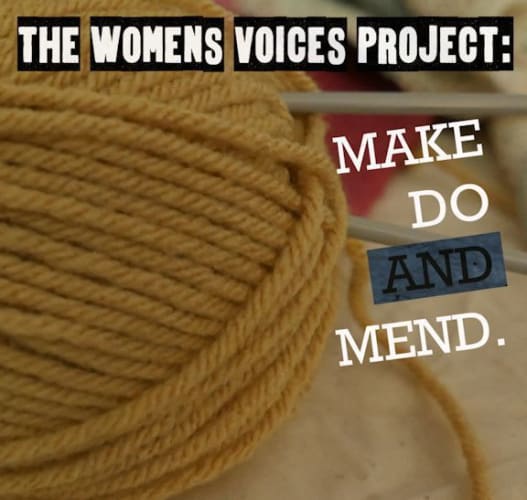I always approach issue-based theatre with some—well, actually, a lot of—trepidation.
All too often, it focuses on the issues at the expense of the theatre. For example, the characters react in a way which meets the needs of the theme rather than according to the sort of people they are. At the most extreme, they become caricatures rather than characters.
Frequently as audiences, we feel we must applaud the worthiness of such productions and make allowances for the lack of real theatricality in the pursuit of moral or ethical good.
Or else we feel we are back in the days of the Victorian Melodrama where evil is mind-blowingly bad and good is simperingly sentimental, where caricatures have become cartoons.
Not with Make Do and Mend—although, dealing as it does with domestic abuse in the lives of three women, it lies wide open to these pitfalls.
It’s a verbatim piece and writer (and director) Rachel Adamson has selected her characters’ words wisely, letting them not only tell their stories (without any sensationalism) but also reveal themselves, their characters and personalities, at the same time. However there’s no breast-beating or pleas for pity; these women tell their stories “as is” with a sense of resignation and almost acceptance.
Of course they hurt; of course they carry scars; of course they regret lost hopes and lost happiness, but it has been part of their lives for so long that, although they are naturally glad to have escaped, the rawness of the emotion has worn away and, frankly, that makes their telling of their stories so much more effective.
Each woman has a distinctive personality: Dorothy (Christina Berriman Dawson) is the oldest, a woman with a dry sense of humour and something—in spite of everything that's happened to her—of a twinkle in her eye; Nadia (Ellie North) is possibly the youngest and least resilient whilst Lorna (Rosie Stancliffe) is, at first sight, the brash Geordie lass but she has far more depth than that description would suggest. All three actors bring their characters to achingly real life.
The play begins with them sitting in a line facing the audience and knitting, which is, we are to suppose, what they were doing when they were being interviewed. They are talking, not actually to the audience but to the interviewer—whom they are also teaching to knit! It makes for a much more natural flow to the words than merely addressing the audience could ever produce.
But they are not static: at significant moments in the stories, there are illustrations of what is going on. This is not “acting out” the scenes, but rather movement director Alys North (who is a dancer and choreographer) has distilled the essence of the happenings into an effective visual support to the spoken words.
The aim of the production is to “highlight the extent and impact of domestic violence” and it certainly succeeds movingly and effectively.
The production tours to (5 October) The Witham, Barnard Castle; (6 October) The Dolphin Centre, Darlington; (13 October) Civic Hall, Stanley and (14 October) Town Hall, Bishop Auckland.
